In This Article
Parashooter Gear is a small semi-custom tactical nylon shop that has done an excellent job of filling some market niches with well-made and innovative gear. We previously reviewed their AK-centric VOLK chest rig which served us well in training. More recently, they released a new rig called the Pathfinder. The premise is simple: a flat-laying multi-cell panel with laser cut slots to attach MOLLE/PALS style pouches on the front, with a soft hook-and-loop panel on the back for a drop down or “dangler” style pouch. The Pathfinder is available in three different sizes: 3-, 5-, and 7-cell. We chose to split the difference and review the 5-magazine model. Pricing ranges from $85 to $150 depending on size.
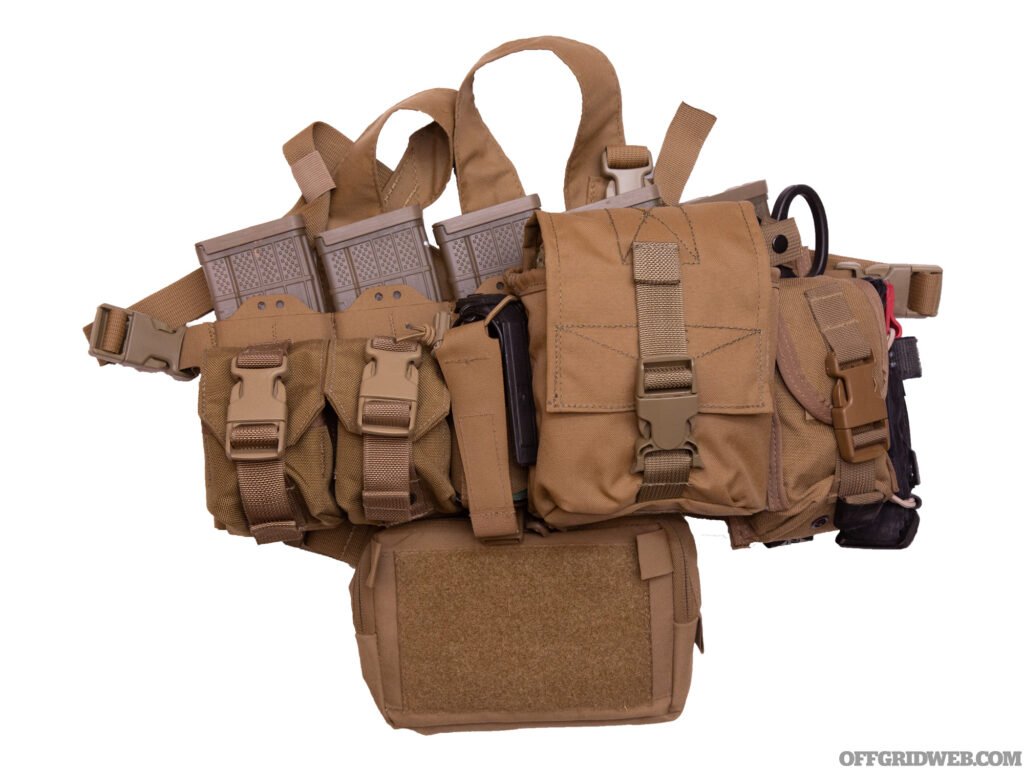
Above: Pathfinder chest rig fully loaded with abdominal/drop pouch.
After the market endured a steady firehose of mini- and micro-sized chest rigs coming to market for the better part of the last decade, there’s been a palpable shift in the number of new chest rigs being scaled up to accommodate more ammo and more load carriage. There are two basic schools of thought that go into this dichotomy.
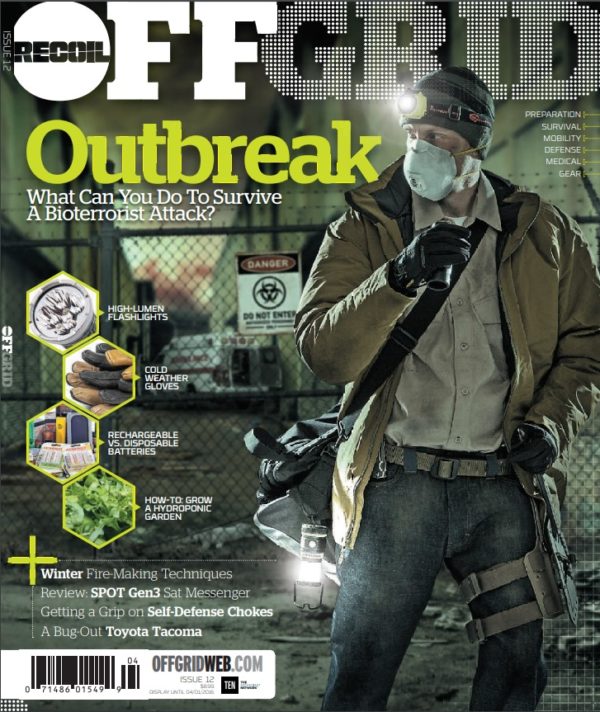
One concept is that “ounces equal pounds, and pounds equal pain”. Besides batteries and water, loaded magazines are one of the heaviest things you’ll probably have in your loadout. Smaller rigs are also easier to conceal when worn, with a large hoodie or windbreaker often being enough to completely conceal a 2- or 3-mag chest rig. Finally, it can be fairly argued that the odds are pretty slim for a prepared citizen getting into a protracted gunfight that will require more than 60-100 rounds. Even if this does wind up being the case, you can carry fewer mags on your kit while keeping more pre-staged in your house, car, or bugout bag.
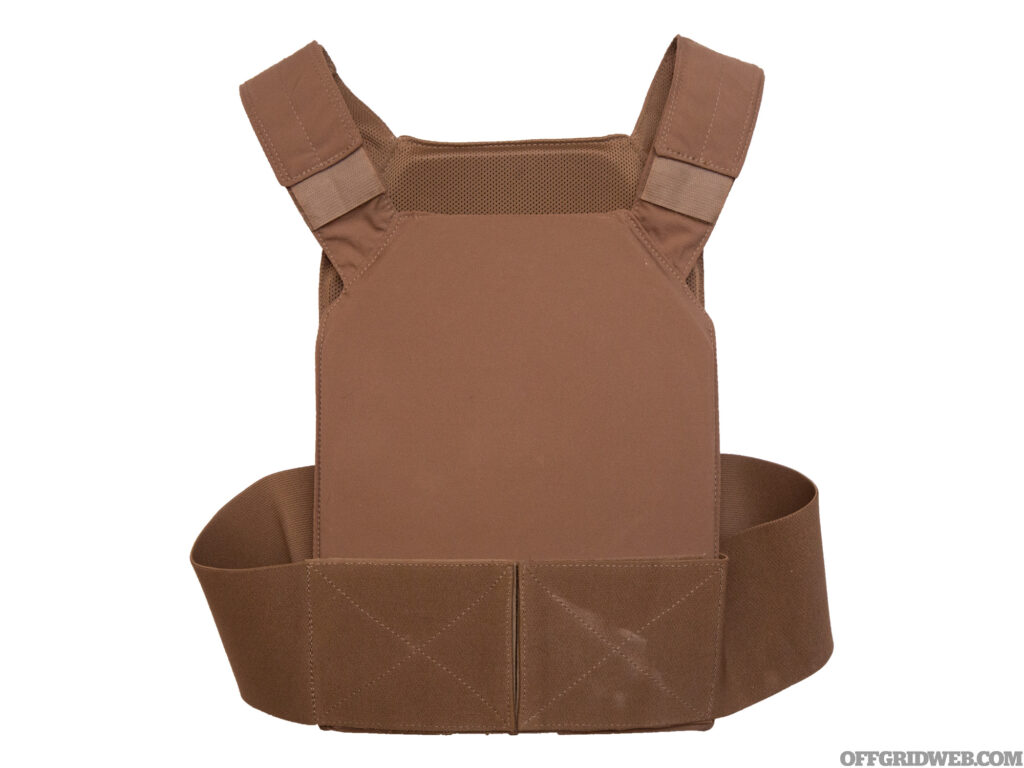
Above: First Spear Slick plate carrier with elastic cummerbund.
Juxtaposed to this philosophy is the idea that the prepared citizen must be capable of self-sustaining more fully for longer periods of time during a protracted emergency. While this might not necessarily include more shooting, larger chest rigs can also carry more other stuff that is quickly accessible on the move. Loading up a 100-pound pack is great in theory, but if you have to stop, drop your pack, and dig through it for every little gadget or tool in your inventory, this can be time-consuming or even detrimental to survival. Having more of those tools riding on your chest not only increases accessibility but balances total load weight to make movement easier.
The 5-cell Pathfinder is designed to hold 5 30-round AR-pattern magazines, but we have seen photos in the wild of these rigs carrying some types of AK mags without issue. But larger .30 caliber magazines such as AR-10, FAL, M1A, etc will be too large to fit into the Pathfinder. Each magazine pouch has 2 columns of laser-cut attachment slots, for a total of 10 rows of webbing on our test sample. The rig ships with two male-end side release buckles on the top, allowing the Pathfinder to be clipped directly onto plate carriers or web harnesses that already have matched female attachment hardware. For those who wish to use this as a standalone chest rig, there are two loops on each end of the placard, and four split-bar female buckles are included in the packaging. The harness you see here was supplied by Parashooter for review purposes, but any standard chest rig harness with the same sized buckles will work. It should also be noted that the mag pockets do not have any active retention and rely on elastic tension. This is probably fine for most applications but, if you desire an over-the-top bungee, there are small “tabs” built into the top of each pouch with two holes pre-punched in each for passing bungee cord through.
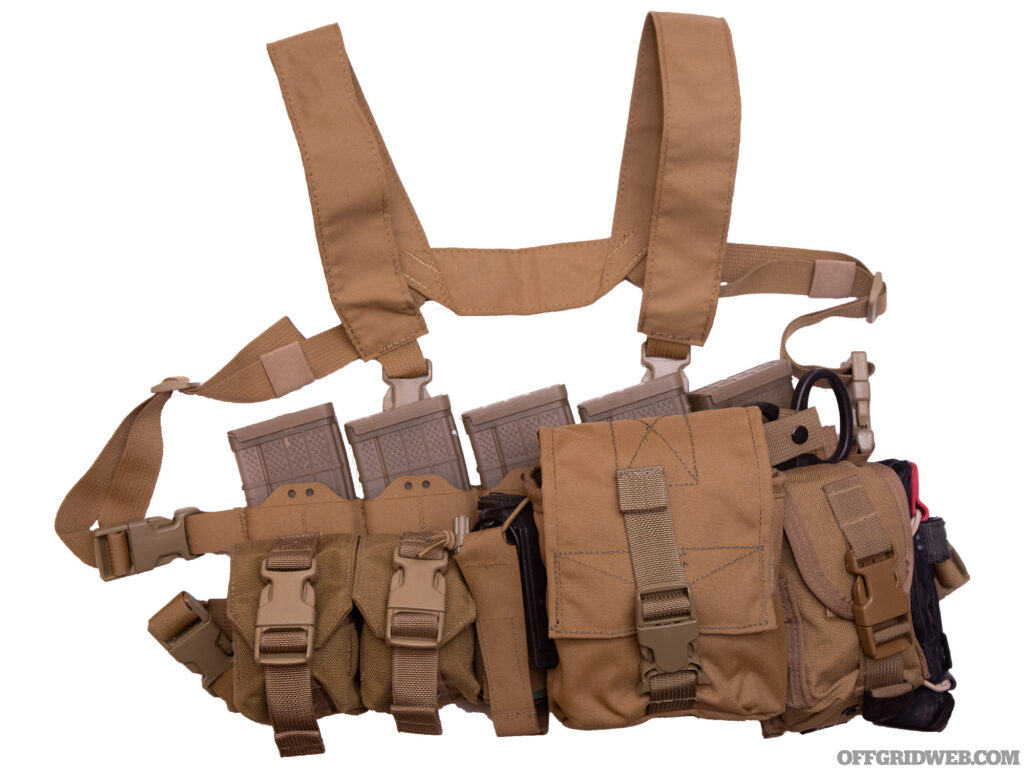
Above: Pathfinder chest rig without drop pouch.
After years of running reduced-footprint micro chest rigs, we were pleasantly surprised with how much attachment room we had with the Pathfinder. To make the most of the available load space, we attached the following pouches:
1. An XL Multi-Function Pouch from Arbor Arms. The MFP is exactly as the name describes. A large flap-closure, bucket-style pouch meant to hold whatever you can fit in it. In this case, we filled it with an Armasight PVS-14 white phosphorous night vision monocular, with Wilcox dovetail mount, and a Crye Precision NightCap.
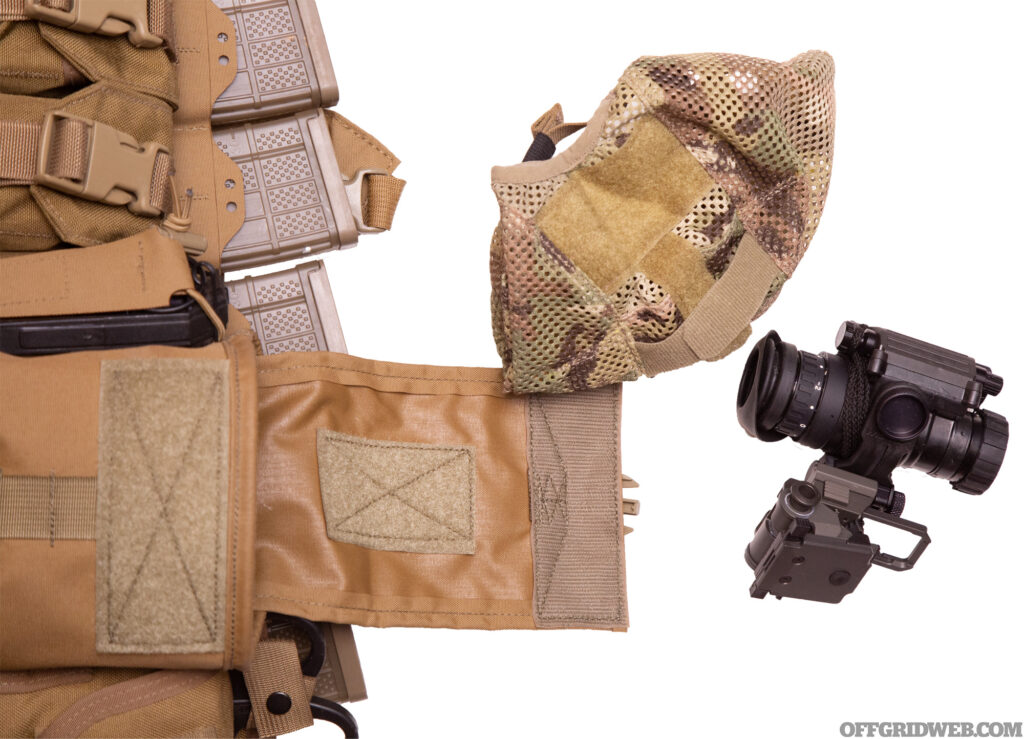
Above: Arbor Arms XL Multi-Function pouch unpacked. Easily stores useful equipment like this Armasight PVS-14 night vision monocular and Crye Precision Nightcap.
The NightCap is a soft-cover alternative to mounting night vision on a helmet for situations where you need to use your NVGs hands-free, but do not require the ballistic or bump protection of a helmet. It’s a great piece of kit that reduces the weight and bulk of a night vision setup from something that has to be stored gingerly in a pack to something that can be balled up around the PVS unit and slid into a chest pouch for fast access. The only downside to the Night Cap is that it doesn’t come with the mounting shroud, but we were able to get a Wilcox shroud from our friends at Night Vision Network.
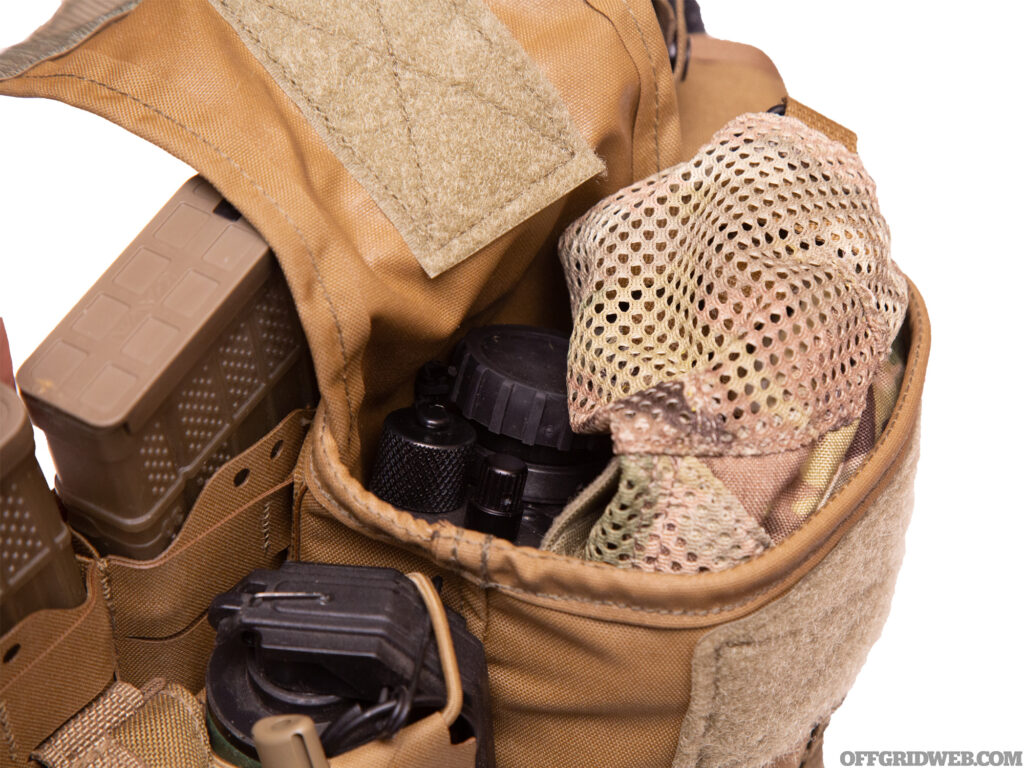
Above: Arbor Arms XL pouch packed with night vision optic and head gear.
2. An HSGI Bleeder Blowout Pouch. This slender, vertically-oriented med pouch has a quick-release buckle as well Velcro closure options. There is just enough room for essential medical supplies, plus a pocket for shears. The MOLLE loops on either side of the pouch help plus up storage capability. We adorned one side with a Grey Man Tactical STRAP TQ to hold a Tourniquet.
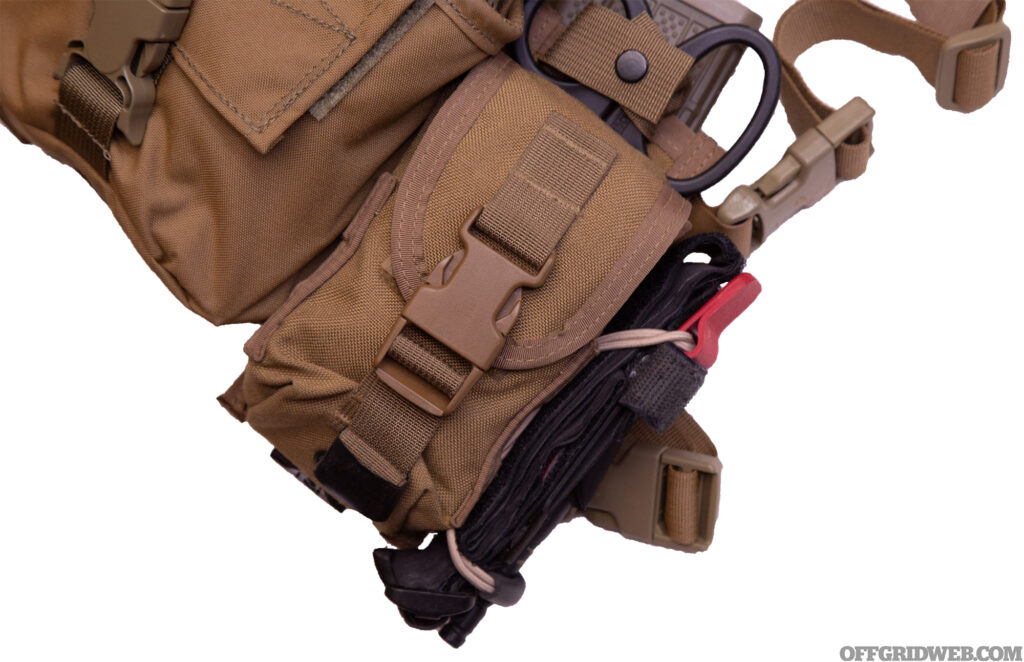
Above: Close up of the HSGI Bleeder Blowout Pouch with a C-A-T tourniquet attached to the side via a Grey Man Tactical STRAP.
3. One Unobtanium Gear frag grenade pouch. These pouches, designed by Longship Designs and available through Unobtanium Gear, were originally designed to be small footprint, ultra-low-bulk pouches for military issue fragmentation grenades. Since we can’t find any of those, it has served as an excellent place to stash a smoke grenade from IWA International. These palm-sized signal aids use a convenient pull-pin fuse, are waterproofed, and put out a good cloud for its size. These can be effective for getting people’s attention and signaling for help, or possibly creating a useful distraction.
4. Speaking of grenades, we also added two USGI surplus grenade pouches. These are inexpensive, durable pouches that make great general-use pouches for small supplies like compasses, batteries, and fire-starting material. We scored these off a military surplus website for $2.50 each. We don’t spend a lot of time talking about surplus pouches as they are rarely the most innovative or interesting pouch choices in any situation, but they are an example of how you can get well-built gear at dirt cheap prices.
In addition to the enhanced load-bearing benefit, standalone chest rigs make a great scalable load-out option when paired with an unadorned armor carrier. We used a Slick plate carrier from First Spear as a companion armor base for the Pathfinder. The Slick is perhaps the most minimalist plate carrier we’ve seen. It’s just a thin, performance-fabric shell to hold plates. No soft armor, no capability to mount pouches or placards – just maximum concealment. Without plates, the carrier is thin enough to ball up and stuff in the leg pocket of your cargo pants. If you’re in a situation where you want armor, but aren’t sure if you need additional gear, the Slick is great “first line” protection that can be rapidly and substantially scaled up by simply putting the Pathfinder on over it. While it’s not as convenient as a full-blown tactical plate carrier, the two-part system can be used in a wider variety of situations, and layered on the fly, keeping your “posture” unobtrusive but your capabilities robust.
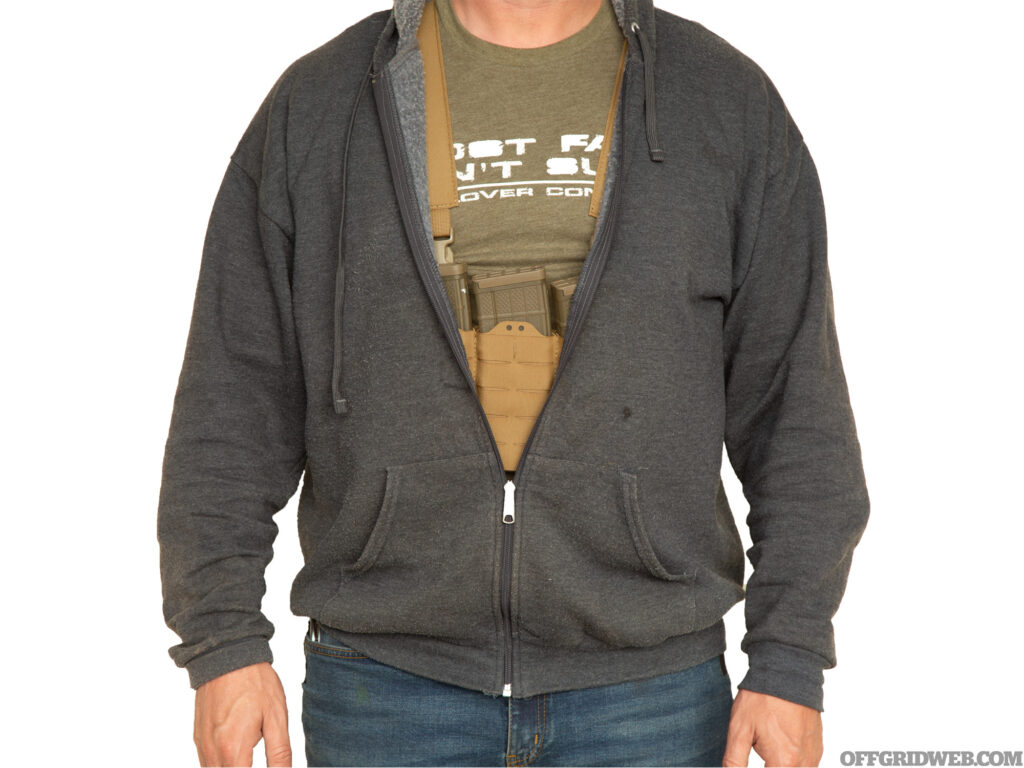
Above: Pathfinders' minimalist approach makes wearing the chest rig easy to wear in a multitude of situations.
This principle can be distilled even further down. If you do not mount any pouches to the front of the Pathfinder, it’s elastic magazine cells — even when loaded — are thin and unobtrusive. Using it just for spare mags, while carrying the rest of your gear in a pack, gives you even more modularity to create and re-create a picked-for-mission gear package as the nature of an unforeseen crisis morphs over time. And, with 150 rounds on tap, you’ve got plenty of firepower to pass around to survival tribe- and team-mates.
 STAY SAFE: Download a Free copy of the OFFGRID Outbreak Issue
STAY SAFE: Download a Free copy of the OFFGRID Outbreak Issue
No Comments